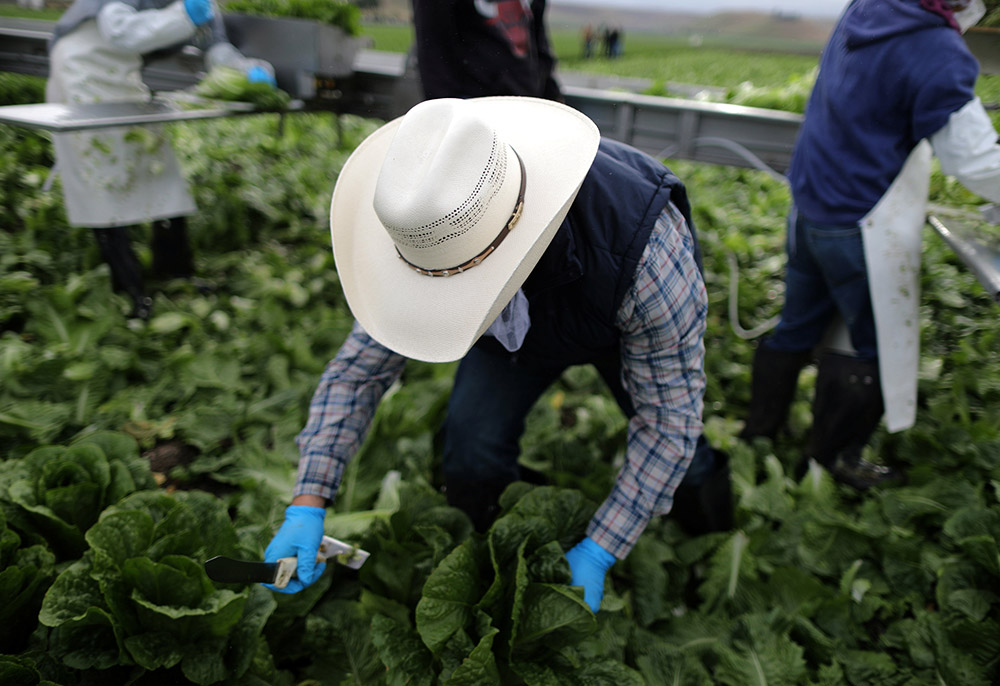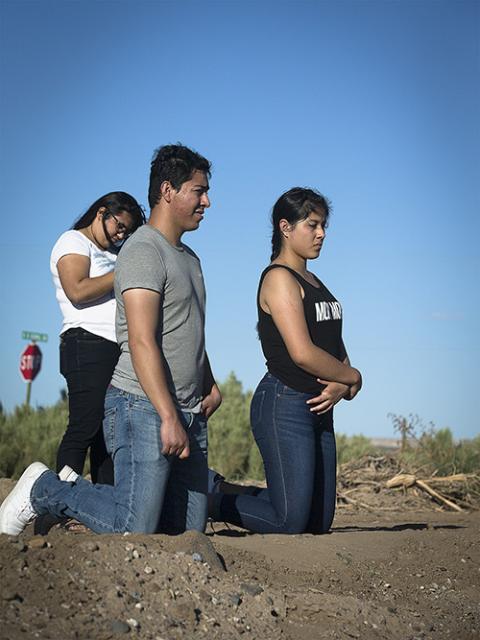
Migrant farmworkers harvest romaine lettuce in King City, California, April 17, 2017. (CNS/Reuters/Lucy Nicholson)
The pungent scent reaches my nostrils before I spot them.
It's just after dawn and I'm walking along the irrigation ditch that leads to the vast New Mexican sky and farmland where rows upon rows of onions bulge from underground, waiting to be picked. As I round a corner, the vista opens before me. Brown earth dotted with white bulbs seems to stretch all the way to the Organ Mountains.
The workers are already in the fields, their backs bent over like wind-up dolls out of steam. Donning long sleeves, straw hats and baseball caps for protection, they heave and hoist long green stems from the ground, pulling up magnificent onions. A strong odor wafts on the wind.
During this season, I see them every morning. The onion pickers. What time they arrive, I don't know. But in the evenings, just before dusk, when I take a second walk, I spot them here again. For the next several weeks these farmworkers will be part of the landscape until, just like the onion bulbs they pick, they'll disappear. Probably destined for other states, other harvests.
It stirs my curiosity. How did they get here, I wonder? Under what circumstances were they hired? Do they work all day under the unrelenting desert sun? Or do they work in shifts, with others to replace them in the evenings? Are they paid well to do this hard-on-the-back job, forever bending and stooping, ending the day reeking of onions from skin to scalp?
If I were to ask such questions, they might wonder about my curiosity. They couldn't know that I've accompanied many of their countrymen and women who made their way across the southern border to seek asylum. They couldn't know that I've listened to the heartaches of Honduran fathers who've left families behind for the promise of a job, Guatemalan mothers carrying children they need to feed, Oaxaca abuelas and tías distraught over the child who was separated from them when they crossed over from Mexico trying to reunite them with parents working in the U.S.
Some came destined to be migrant fieldworkers. Before even arriving at our temporary shelter in El Paso, Texas, they clasped slips of paper carrying names and phone numbers assuring them of work in their new country despite being undocumented.

Migrant farmworkers kneel in prayer during an outdoor Mass Sept. 26, 2019, in Hatch, New Mexico, part of a pastoral encounter by U.S. bishops with migrants at the border. (CNS/Tyler Orsburn)
A cousin in Florida says there's work for me picking strawberries and avocados, said a woman from El Salvador. I have a job on a farm, said another, waving a crinkled, tiny paper in the air. He was headed for Washington.
Another, bound for the harvest in North Carolina with his young daughter, said his sponsor promised there'd be someone to care for his child while he worked. We tried to warn him about trusting this man who's paying his transportation from El Paso. A stranger who's offered a place for him and his daughter to sleep on the floor.
How many people will live there with them, we wonder? But with the promise of a new life comes risks. They all know this. Their need, along with their undocumented status, makes them vulnerable. And their vulnerability makes them targets, for wage theft, unrealistic hours and other abuses.
Turning back is not an option. Nor is complaining about the conditions. They'd risk losing their job, and, worse, risk deportation. For poor and undocumented agricultural workers, unfair treatment and hazardous working conditions are secondary to the need to feed their families.
So they stay silent and live in the shadows. Work hard for what they're offered. And, at the end of the day, they're glad for the money. And we're glad for the stocked supermarket shelves.
During the height of the pandemic, more than 2 million farmworkers were officially deemed "essential" to sustain our food supply chains, according to the Economic Policy Institute, yet they earned far less than some of the lowest-paid workers in the U.S. And neither their employers nor the federal government took any action to support that distinction and protect them.
Day after day, they ventured out, picking produce, standing side by side, at times feeling sick, not calling in sick, not given masks to perform the job they were threatened with losing if they didn't show up, and often returning to overcrowded, inadequate housing where they spread whatever sickness they were carrying. More than half of farmworkers are either unauthorized immigrants or workers with H-2A visas, meaning they are foreign nationals allowed to do temporary agricultural work. They didn't qualify for stimulus checks or government aid or basic health care. Their choice was either work or go without income.
My growing awareness of the plight of farmworkers began in 2013, the year I first visited El Paso on a one-week border awareness trip. At the time, I lived in Virginia, where I took my basic food sources for granted. I never considered how the lettuce, peppers and berries arrived at my local Kroger or Harris Teeter. But my eyes were opened the afternoon our little group stepped into the Centro de Los Trabajadores Agricolas Fronterizos, and I met Carlos Marentes and his wife, Alicia. The Marentes run a nonprofit for farmworkers at the El Paso-Juárez border where they provide basic care, fight for labor rights, and offer these day laborers a cheap meal and place to sleep.
Advertisement
Years later, my moving to El Paso revealed other layers of abuses toward migrants. I learned of the Bracero program, begun in 1942 to address a national shortage of agricultural workers during World War II. The Mexican men who came to apply for a limited number of jobs were subjected to contract abuses, exposed to deadly chemicals with no protection, worked in the heat with no breaks and endured many other mistreatments. Often their widows in Mexico received no compensation for their work-related deaths.
It's an age-old story — the exploitation of agricultural and low-skilled workers. Dorothy Day rallied against it in the 1930s and '40s. Labor activists like Dolores Huerta and César Chávez fought against it on California farms, forming the National Farm Workers Association in the 1960s. Yet, although conditions have improved, injustices and abuses persist.
I know from my experiences at the shelter that multiple migrant families crowd into trailers and mobile homes, sharing beds and a single bathroom, as they pick the current harvest. I've learned that farmworkers are employed in one of the most hazardous jobs in the entire U.S. labor market, according to the U.S. Bureau of Labor Statistics, and suffer very high rates of wage and hour violations.
Further digging taught me that hundreds of thousands of children under the age of 18 work in agriculture, facing the laxest child labor laws amid the most hazardous occupation. In fact, more than half of U.S. deaths in working children occur in child farmworkers, according to Human Rights Watch.
Like peeling an onion, the more I've probed the topic of farmworkers, the more disparities and difficulties I've discovered. So many layers lurk under the surface. Even now, I spy a lone Porta-John perched in the distant field, reminding me of yet another layer. Sanitation.
Amazingly, not until 1987 did the federal government mandate field sanitation standards that required agricultural workers have access to toilets, potable drinking water, and handwashing facilities. Before then, they were forced to relieve themselves right beside those onions they were picking.
Watching the workers reminds me that I have a responsibility to use the knowledge I've gained. Not simply remain on the sentimental surface of this situation, bemoaning their plight. As a Catholic writer and a fellow human being, I need to dig deeper and keep uncovering the layers of injustices and abuses, spread the word to educate others about the reality of migrant workers who bring food to our tables, be a political voice for their rights, and walk alongside them with empathy and greater awareness.
At times, I do the minimum. It feels inadequate. But tonight, when I slice my zucchini and broccoli and peel that onion to throw into my frying pan, I will remember the farmworkers with prayers of appreciation, gratitude and solidarity.








